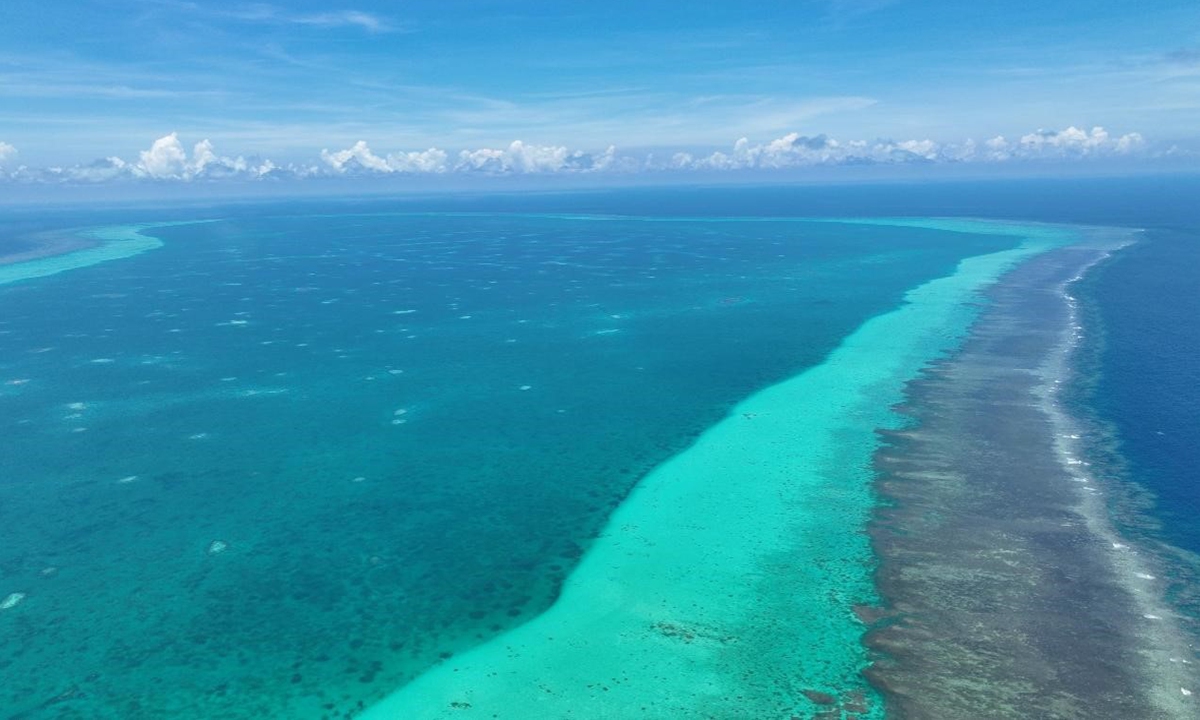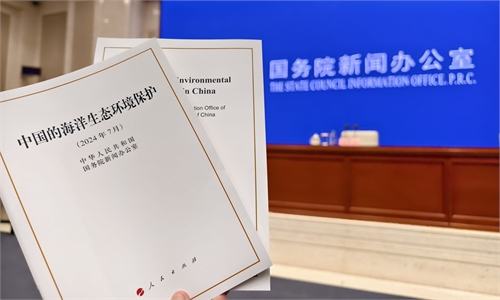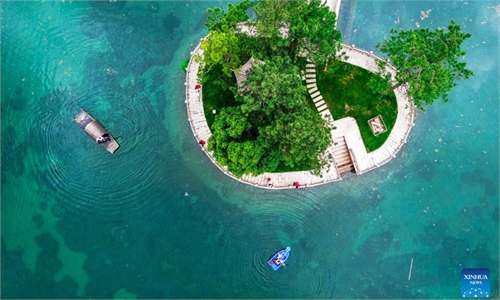
The aerial view of China's Huangyan Dao Photo: Courtesy of South China Institute of Environmental Sciences under China Ministry of Ecology and Environment
China has recently released its National Ecological Protection and Restoration Bulletin 2024, which spotlights China's efforts in maritime protection, with a focus on marine biodiversity, coastal defense, and highly vulnerable areas facing erosion and sand loss.
The bulletin reviews the development of ecological governance in the 75 years from five aspects - national ecological protection and restoration practices, national ecological protection and restoration systems, natural ecological assessments of land and space, ecological protection and restoration actions in land and space, and China's contributions to a green Earth, according to the Ministry of Natural Resources. This is the first time that China has comprehensively reflected on ecological protection and restoration work in the form of a public report.
The country has been emphasizing key areas of marine ecological restoration through an integrated land-sea and river-sea approach, as well as river and sea. Nationwide, approximately 1,680 kilometers of coastline and about 500 square kilometers of coastal wetlands have been restored.
According to the bulletin, the country has designated around 150,000 square kilometers under a marine ecological protection "red line," covering 85,000 square kilometers nearshore and 66,000 square kilometers offshore.
The marine efforts primarily cover marine biodiversity and coastal defense, as well as areas that are extremely vulnerable to coastal erosion and sand source loss.
The country's maritime protection and restoration efforts were made due to the creation of systematic plans and cross-regional coordination mechanisms for marine environmental challenges, Chen Xiangmiao, a deputy director of the Institute of Marine Science, National Institute for South China Sea Studies, told the Global Times on Thursday.
Some key areas for this coordination include the Yellow Sea, Bohai Sea, and East China Sea and South China Sea. For example, environmental protection is not conducted in isolation for the Bohai Sea; rather, it is being transformed into a coordinated regional effort.
Additionally, country advocates the maritime protection and restoration through coordination between land and sea, which refers to as integrated land-sea management. In simpler terms, it is about achieving a comprehensive approach to land and sea management when marine environmental problems need to be addressed, Chen noted.
Moreover, in terms of ecological protection, local residents' role cannot be ignored.
Xisha Islands in South China Sea have made great efforts in the greening of islands, the cleaning of reefs and floating wastes. Fishermen told the Global Times that 20 years ago, the Xisha Islands were far less clean and tidy. Nowadays, fishermen are more and more involved in the protection of the ecological environment.
"We go to check our reef's changes weekly, to protect sea turtles and migratory birds spawning, and to help treat injured animals. In addition, we also engage in daily cleaning of sea floating garbage, picking up the trash and sorting it at the cleaning station," Fu Mingyou, a fisherman on Zhaoshu Island, said. People treat protecting the environment and ecology a responsibility of their own, Fu noted.
The country's maritime environmental protection efforts are also legally guaranteed. Since the beginning of this year, China has a revised Marine Environment Protection Law implemented. It underscores the protection of marine biodiversity, with improved provisions on enhancing its surveying and assessing system, as well as on maintaining and restoring important marine ecological corridors.
The revised law prohibits activities such as dumping, stacking and disposal of solid wastes on the shore, and requires that measures be taken to prevent solid waste from entering the sea, Xinhua News Agency reported.
"We will deepen the reform of the ecological civilization system, improve the integrated protection and systematic governance mechanism for mountains, rivers, forests, fields, lakes, grasslands, and deserts, and establish a diversified investment mechanism for ecological protection and restoration," Wang Lei, director of the Department of Land Space Ecology Restoration of the Ministry of Natural Resources, said when introducing the bulletin, China Central Television reported.



